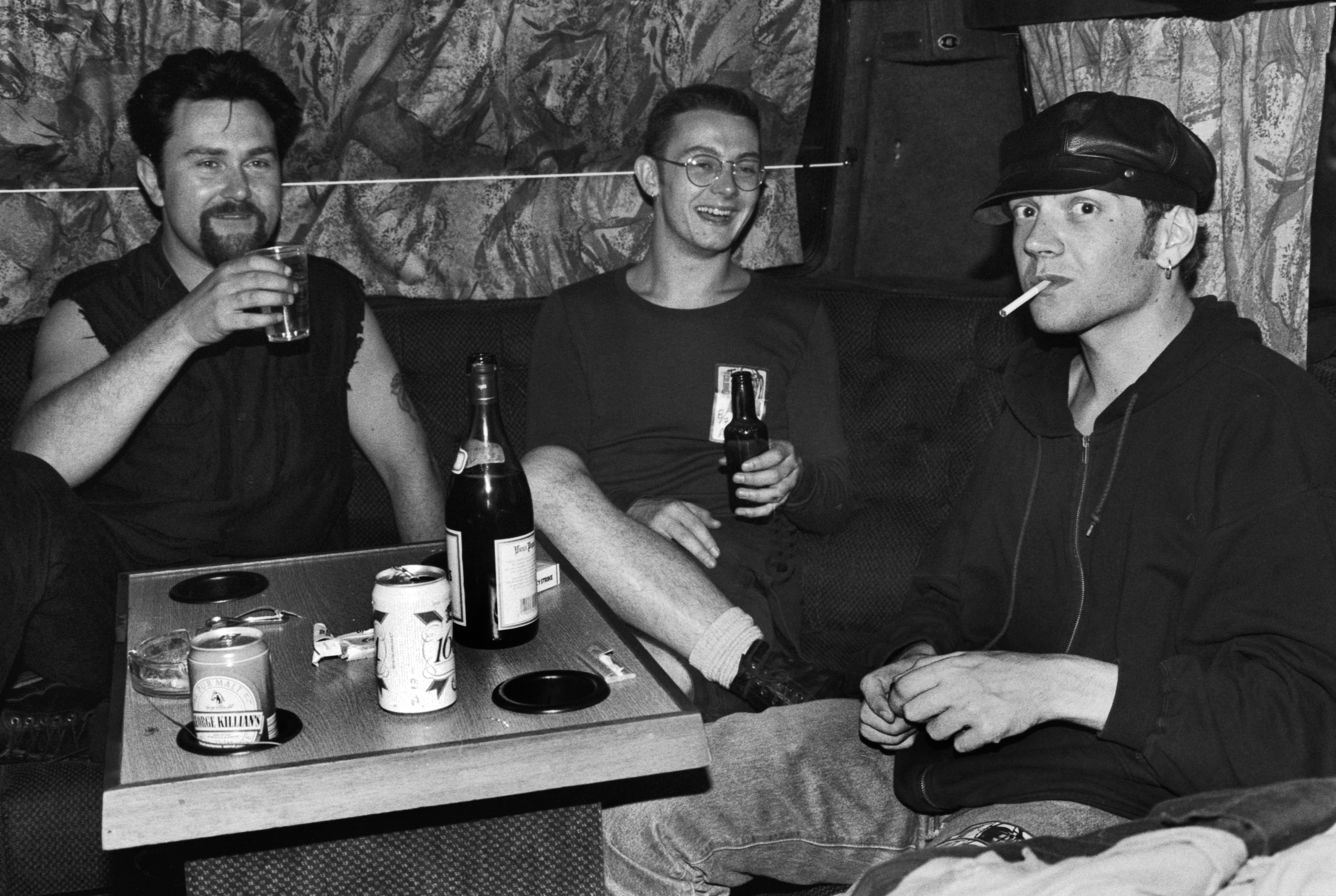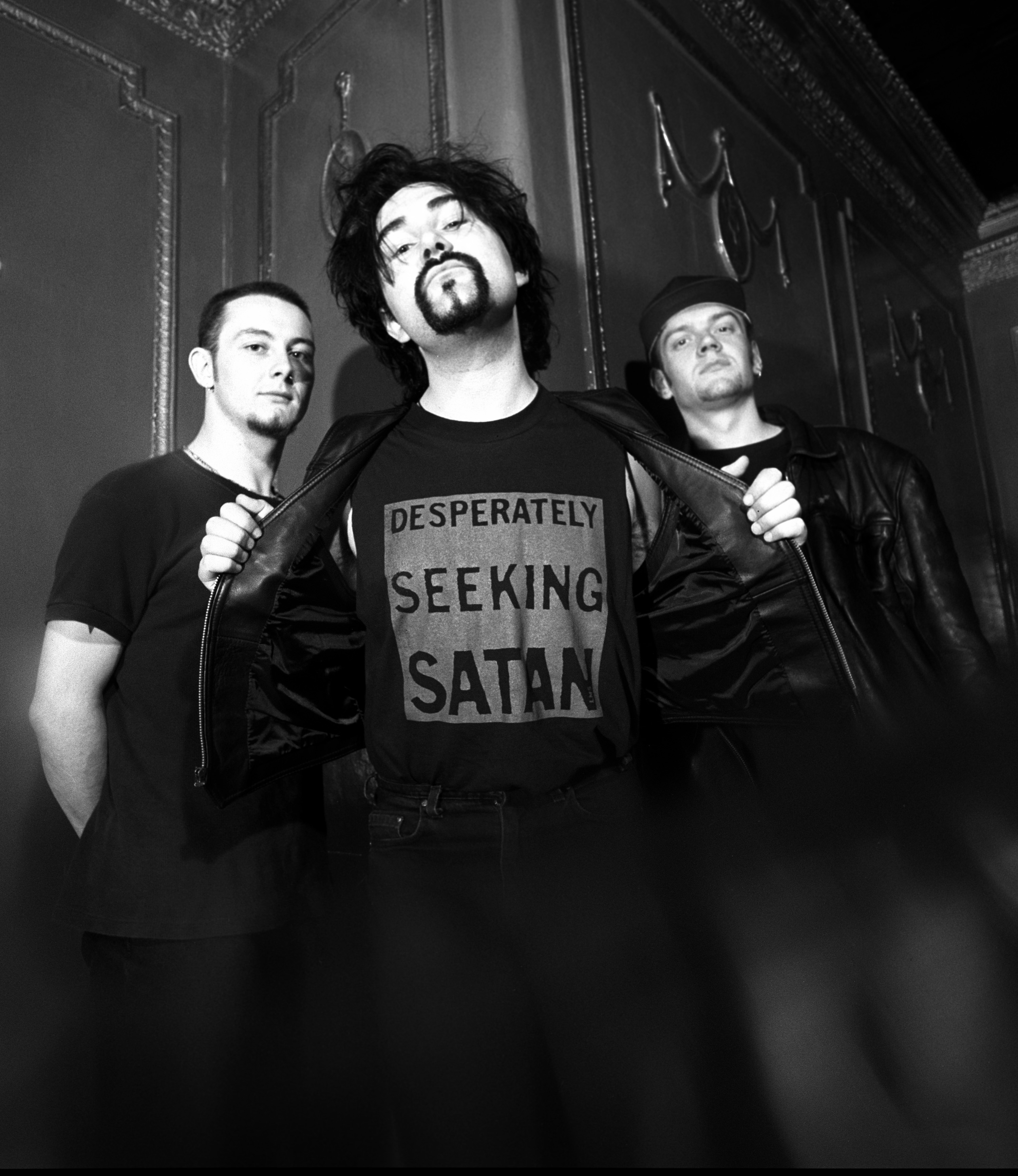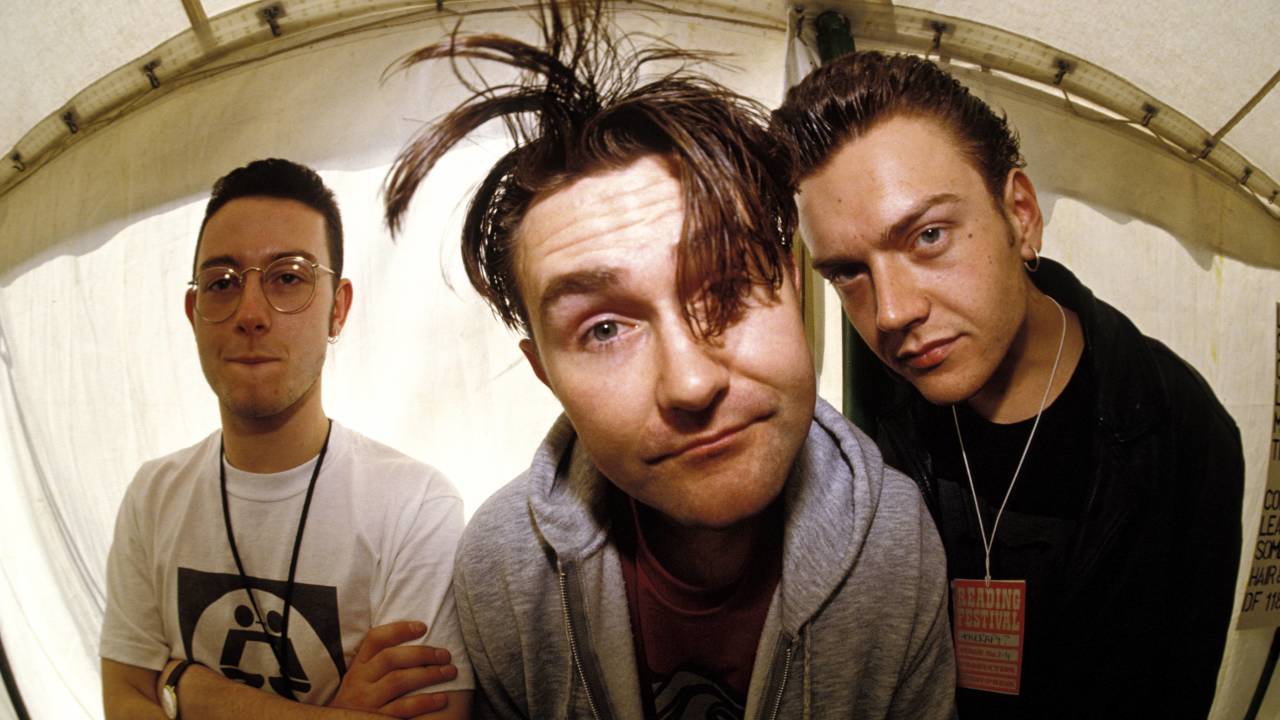Although they’ve long since become known as one of the UK’s most obstinate and indestructible bands, Therapy? began life entrenched in the shady world of underground noise rock, emerging from their small-town origins with their debut mini-album Babyteeth in 1991.
A gritty and twisted blend of angular riffs, clattering percussion and hostile noise, it was enthusiastically (and predictably) endorsed by maverick DJ John Peel, as the young trio swiftly became known as Northern Ireland’s contribution to a small but fearsome gaggle of bands that also included the likes of Silverfish and Terminal Cheesecake. Defiantly awkward and aggressive, none of them were making music that anyone would knowingly describe as commercial on any level.
Following Babyteeth with mini-album Pleasure Death and a more polished but no less cantankerous debut full-length, Nurse, Therapy? were an undeniably thrilling proposition but clearly not cut out for mainstream success. As a result, it came as a huge surprise, both to the Irishmen’s fans and seemingly to the band themselves, when they inadvertently reinvented themselves as a bold and radio-friendly mainstream rock band, storming the charts with Screamager, the lead track from their 1993 Shortsharpshock EP.
A huge hit in the UK singles chart, it became one of the biggest rock club anthems of the early ’90s and an accidental blueprint for what would become Therapy?’s breakthrough album and by far the biggest record of their career.
“When we formed the band we were completely into bands like Big Black, Tar, Hammerbox and all that kind of stuff,” recalls frontman Andy Cairns. “But after we did the Nurse album things changed. The next album all started with one song, which was Screamager. We’d been talking about the history of Ulster rock and bands like The Undertones and Stiff Little Fingers, and when I was 12 or 13 those bands were massive in Ireland and I was a big fan.
“I wrote Screamager, kind of as an Ulster pop tribute song, and I brought it to the lads. They liked it, but we decided that it maybe wasn’t the kind of stuff we should be doing. But our producer Chris Sheldon was due to record some new stuff with us and he really liked Screamager because it had that big riff and the Helmet-style stop-start thing and the chorus was really catchy. That was the start of Troublegum.”

Inspired by the effusive reaction to Screamager and their new-found status as Britain’s unlikeliest pop stars, Therapy? threw themselves whole-heartedly into the process of writing an album’s worth of material that took their first bona fide hit as a rough template. Although the gnarly riffs and extraneous noise of their early records remained a fundamental part of their sound, the band’s new songs were much more direct and melodic, leading to an album that brimmed with huge hooks and moments of unashamed crowd-pleasing simplicity.
“When we first played Screamager to the record company they said, ‘We’re not sure your fans are gonna like this!’” laughs Andy. “But once they gave it a push it ended up being a hit, and because it worked everyone seemed to like it. [Chris] Sheldon was pencilled in to do the album and he was saying, ‘Have you got anything else like that?’ I had a song from an old band I’d been in that became Nowhere and I had Turn as well, so we demoed some of this stuff and it sounded great, and we just decided to make a whole album of it.
“We were stepping outside our comfort zone and taking a chance because we weren’t known for that kind of thing and it could easily have gone wrong! But Sheldon was very involved as a producer and he encouraged us to be really blunt and direct and to lose all the discordant chords. It all fell together. We had a blueprint from the other songs we’d been working on, like Screamager and Nowhere and Die Laughing, and when we finished the album we realised that, because it was all in the same vein, it had this uniformity to it and that made it more powerful.”
Recorded in several studios in England during 1993, Troublegum still bore traces of the antisocial noise and off-kilter rock that had always been a major part of Therapy?’s sound, but this was primarily an album dominated by enormous sing-along anthems. From the desperate threats of brutish opener Knives and the radio-mincing choruses of Screamager and Nowhere through to the metallic thump of unapologetic riff-monsters like Trigger Inside and Femtex, it was a record custom-built to unite the rock tribes, even stopping off for a highly convincing cover of dour post-punk legends Joy Division’s Isolation along the way.
Another influence that could hardly be missed on Troublegum was that of Helmet, a band that Therapy? had toured with in 1993; an association that enabled Andy Cairns to recruit frontman Page Hamilton to contribute a suitably weird and wild guitar solo to jaw-jarring album highlight Unbeliever.
“We’d done a big tour with Jesus Lizard and Helmet when Screamager came out, and Page was familiar with all the material we’d done up until the Nurse album,” recalls Andy. “He really liked Screamager, and we’d written the song Unbeliever – which is completely Helmet, a total Helmet rip-off – so we asked him to be on it. We said, ‘We’ve made this tribute to yourselves and we’d like you to play on it!’ and he said, ‘Sure, no problem! Send me the stuff!’ We sent him the tapes, he did his stuff and sent it back and he’d done exactly what we wanted him to do. It’s still one of my favourite tracks on the record.”
In keeping with their new philosophy of boiling everything down to the simplest of formulas, Therapy? were also undergoing a major lyrical sea change too, as Andy’s predilection for the obscure and bizarre was briskly usurped by a new approach that meant that every last song on Troublegum had a line or two that could be easily bellowed by the increasingly huge drunken crowds that were coming to see the band play live. From Knives’ delightful refrain of ‘I’m gonna get drunk/Come round and fuck you up!’ and Die Laughing’s ‘I think I’ve gone insane/Can’t remember my own name’, through to Brainsaw’s closing cry-for-help of ‘I’m in Hell and I’m alone!’, this was a bleak and disturbing record, but one that had its tongue firmly planted in its cheek.
“Like the music, we stripped the lyrics down,” says Andy. “[Acclaimed producer and noise rock legend] Steve Albini always said that lyrics should be punchlines, and that’s what we tried to do: make them short and snappy. They’re very straight to the point and there’s no long-winded obliqueness – that was the bit I found the hardest. I worried that some of it was a bit nursery rhyme because we’d simplified it so much. I wanted to make it dark but to have some humour in it as well. There was genuine rage in there, at the absurdity of the human condition. On songs like Knives, it wasn’t meant to be taken literally, but it’s about incompetent, impotent rage! I also had a particularly potent acid trip which partly inspired that one! Ha ha ha!”

Rounding off this landmark album with a secret ‘hidden track’, a warped version of You Are My Sunshine (“We thought it would be really sarcastic to end the album with this twisted little nursery rhyme,” Andy laughs), Therapy? swiftly became aware that they had created a monster that could hardly fail to connect with all the kids who’d been won over by Screamager a few months earlier.
But ever the awkward bastards, the band insisted on an album cover that brilliantly encapsulated the sense of malevolent mischief that bubbled beneath the surface of Troublegum’s catchy tunes and thin façade of pop-punk cheeriness. Created by (and starring) photographer Nigel Rolfe, it depicts a naked man with his head stuck in a dustbin; further proof that Therapy? were refusing to take the traditional approach to this rock’n’roll business.
“Nigel was a performance and design artist,” explains Andy. “He did a series of pictures where he covered himself in white paint and rolled around in sawdust. We’d been talking with him about this Samuel Beckett play, Endgame, which features guys in dustbins at the back of the stage, and then he brought this huge portfolio of stuff a couple of weeks later, featuring this naked man covered in sawdust, and the dustbin shot was the one that we all liked. It’s quite divisive – some people say it’s the worst cover they’ve ever seen!”
Released on 7 February 1994, Troublegum thrust Therapy? into the UK rock spotlight. It brought them a handful of hit singles, a Mercury Music Prize nomination and, perhaps most surprisingly, the unequivocal support of the metal community. Lured in by the album’s big riffs, huge hooks and pitch-black humour, metal fans claimed the band as their own, albeit only until Andy and his bandmates moved the goalposts once again for 1995’s Infernal Love.
“Being embraced by metal fans was unexpected but great,” the singer states. “We came from the sticks and just loved music, so any band that came through we’d go and see. One week it would be The Jesus And Mary Chain or The Smiths and the next Metallica and Anthrax, and that stayed with us. We didn’t realise this at the time, but something like Trigger Inside had a real British heavy metal feel to it, completely unintentionally.”
As if to emphasise their newfound bond with the metal world, Therapy?’s post-Troublegum adventures hit a peak when the band were selected to play at the Monsters Of Rock festival at Castle Donington on 4 June 1994, sharing the bill with the likes of Pantera, Aerosmith and Sepultura. As Andy admits, it was both a thrilling and surreal moment for a band whose time had very much arrived.
“Michael [McKeegan, bassist] grew up listening to Black Sabbath, AC/DC and Motörhead, and so when we found out we were playing at Donington, he shat his pants!” he laughs. “When we got there and saw people singing the words to our songs, it blew us away. We were on a sugar rush and just enjoyed every second of it. It was a special moment for all of us.”
Therapy? have just been added to the bill for the Stone Free Festival at the 02 this summer, get your tickets here.

